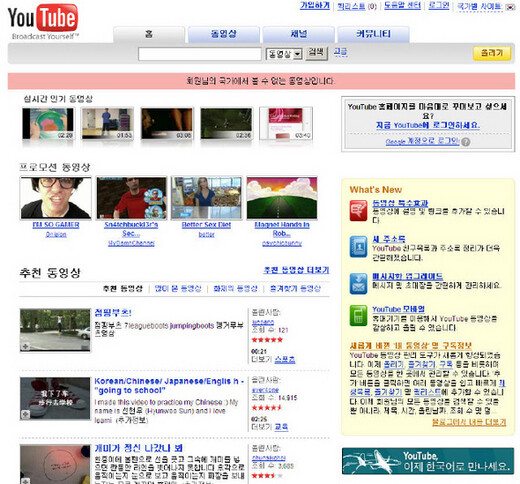hankyoreh
Links to other country sites 다른 나라 사이트 링크
NPA orders Google to remove video from YouTube

Controversy is flaring after an Internet crime investigation unit of the National Police Agency was found to have ordered Google Inc.’s YouTube, the world’s most popular video-sharing Web site, to remove footage from a South Korean TV report about allegations that a company in which a brother of NPA Chief Eo Cheong-soo invested was involved in prostitution. The NPA also ordered domestic Internet portals such as Naver and Daum to delete the video footage, which was originally televised by Munhwa Broadcasting Corp.’s Busan branch. Under South Korean laws governing the Internet, a person can ask an Internet portal to remove information from its Web site if the information defames the person in question. The NPA has been accused of taking unlawful and excessive action towards Internet portals, where freedom of expression and communications should be guaranteed, to defend the reputation of the NPA chief’s family.
On July 24, an official at Google’s Korea unit said, “We received an official statement on May 27 from the NPA’s cyber terrorism countermeasure team demanding that we delete video footage about a brother of NPA Commissioner General Eo Cheong-soo, citing defamation. That evening, we temporarily deleted two pieces of video footage. The Internet Protocol addresses for both pieces of video footage are blocked so users in South Korea can’t access them,” the official said. The NPA was found to have sent the same official statement to other local Internet portals such as Naver and Daum as well as video-sharing Web sites.
The original footage, aired by MBC’s Busan branch on April 23, reported that the brother of NPA Commissioner General Eo had allegedly managed a hotel that allowed prostitution. The report was credited with the “This Month’s Journalist” award from the Journalist Association of Korea in June. Yang Guen-won, the head of the NPA’s Internet crime investigation unit, said police had “sent an official letter, according to legal procedure, after judging that the controversial report broadcast by Busan MBC is related to the reputation of the entire police organization, not just Commissioner General Eo Cheong-soo himself.”
However, critics blamed the NPA for taking excessive action because, under the current laws, it has no right to ask Internet portals to delete the video footage and it has not taken any legal action, such as filing a complaint with the Press Arbitration Commission.
Kim Gap-bae, an attorney, said, “The Act on Promotion of Information and Communications Network Utilization and Information Protection permits a person to ask an Internet portal to remove posted material if the person feels they have been defamed. For defamation cases involving public officials, in particular, an individual, not a state organization, should file the complaint.”
Unlike domestic Internet portals, Google’s Korean unit strictly bans it from editing materials posted on its Web site. Google’s Korean unit asked a legal department at its U.S. headquarters to sort out whether the video footage could cause defamation, and Google’s U.S. headquarters replied that it could not be constituted as such. In spite of the reply, Google’s Korean unit had still blocked the footage for 56 days, or until July 23, when The Hankyoreh began investigating the issue.
This means that South Koreans cannot watch the video footage on the Korean-language version of the YouTube Web site, but the footage is still available at other YouTube sites based in the United States and other nations.
Internet users have criticized the police and Google’s Korean unit, saying, “Police are curbing freedom of expression on the Internet unconditionally, making the country a state in which censorship still exists.”
Please direct questions or comments to [englishhani@hani.co.kr]
Editorial・opinion
![[Column] Park Geun-hye déjà vu in Yoon Suk-yeol [Column] Park Geun-hye déjà vu in Yoon Suk-yeol](https://flexible.img.hani.co.kr/flexible/normal/500/300/imgdb/original/2024/0424/651713945113788.jpg) [Column] Park Geun-hye déjà vu in Yoon Suk-yeol
[Column] Park Geun-hye déjà vu in Yoon Suk-yeol![[Editorial] New weight of N. Korea’s nuclear threats makes dialogue all the more urgent [Editorial] New weight of N. Korea’s nuclear threats makes dialogue all the more urgent](https://flexible.img.hani.co.kr/flexible/normal/500/300/imgdb/original/2024/0424/7317139454662664.jpg) [Editorial] New weight of N. Korea’s nuclear threats makes dialogue all the more urgent
[Editorial] New weight of N. Korea’s nuclear threats makes dialogue all the more urgent- [Guest essay] The real reason Korea’s new right wants to dub Rhee a founding father
- [Column] ‘Choson’: Is it time we start referring to N. Korea in its own terms?
- [Editorial] Japan’s rewriting of history with Korea has gone too far
- [Column] The president’s questionable capacity for dialogue
- [Column] Are chaebol firms just pizza pies for families to divvy up as they please?
- [Column] Has Korea, too, crossed the Rubicon on China?
- [Correspondent’s column] In Japan’s alliance with US, echoes of its past alliances with UK
- [Editorial] Does Yoon think the Korean public is wrong?
Most viewed articles
- 1[Column] Park Geun-hye déjà vu in Yoon Suk-yeol
- 2Will NewJeans end up collateral damage in internal feud at K-pop juggernaut Hybe?
- 3The dream K-drama boyfriend stealing hearts and screens in Japan
- 4Thursday to mark start of resignations by senior doctors amid standoff with government
- 5Why Korea shouldn’t welcome Japan’s newly beefed up defense cooperation with US
- 6[Guest essay] The real reason Korea’s new right wants to dub Rhee a founding father
- 7N. Korean hackers breached 10 defense contractors in South for months, police say
- 8[Editorial] New weight of N. Korea’s nuclear threats makes dialogue all the more urgent
- 9Up-and-coming Indonesian group StarBe spills what it learned during K-pop training in Seoul
- 10Terry Anderson, AP reporter who informed world of massacre in Gwangju, dies at 76